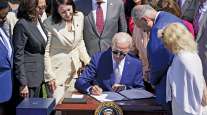Senior Reporter
Biden’s Infrastructure Plan to Total $2.25 Trillion, Include Corporate Tax Hikes

[Ensure you have all the info you need in these unprecedented times. Subscribe now.]
President Joe Biden announced a $2.25 trillion climate change-centric infrastructure plan meant to repair the country’s roads and bridges, and guarantee nationwide access to broadband internet and safe drinking water.
On March 31 in Pittsburgh, the president debuted his “American Jobs Plan” proposal, an aspect of the “Build Back Better” framework he previewed as a presidential candidate.
“The American Jobs Plan would build new rail corridors and transit lines, easing congestion, cutting pollution, slashing commute times, and open up investment in communities,” Biden said. “The American Jobs Plan will lead to a transformational progress in order to tackle climate change.”
“We have to move now because I’m convinced that if we act now, in 50 years people are going to look back and say this was the moment that America won the future,” Biden said.
Freight connectivity, severe weather resilience across mobility networks and vast access to electric vehicles are key elements of the plan, which already has backing among Democrats on Capitol Hill but faces slim hopes for bipartisanship from Republicans who balk at the price tag.
Overall, the president proposes $115 billion for highways, roads and bridges, $85 billion for transit, $80 billion for Amtrak, $25 billion for airports and $17 billion for inland ports. Biden also is proposing $50 billion for infrastructure climate resilience and $35 billion for climate science programs, investments meant to help structures withstand the impacts of severe weather. Another $100 billion will target expanding high-speed broadband, while $100 billion more will go toward modernizing the electric grid.
On freight, Biden said he wants to enhance grant and loan programs designed to amplify passenger and freight rail connectivity, efficiency and electrification.
Specific to electric vehicles, the plan dedicates $174 billion to grow market presence. Transportation officials would be tasked with establishing a national network of 500,000 electric vehicle charging stations by 2030. Additionally, the federal vehicle fleet, including U.S. Postal Service vehicles, will be considered for electrification.
The plan will “enable automakers to spur domestic supply chains from raw materials to parts, retool factories to compete globally, and support American workers to make batteries and [electric vehicles],” according to the White House.
DETAILS ON THE PLAN: From whitehouse.gov
The plan also calls for promoting racial equity and dedicates billions of dollars for public schools, federal buildings, Veterans Affairs hospitals and “care” infrastructure for senior citizens and individuals with disabilities.
The eight-year plan would be backed by changes to corporate tax structures. The president intends to propose increasing the corporate tax rate to 28% from the 21% levy set in 2017 under President Donald Trump’s tax law. Additionally, the White House would look to generate revenue by eliminating certain tax preferences for fossil fuels.
American Trucking Associations welcomed the president’s plan to address the nation’s roads, but expressed concern for some of the plan’s funding proposals.
“The health of our economy, strength of our supply chain and safety of the motoring public require us to make big, bold investments in our nation’s roads and bridges, and this plan would steer much-needed funding to critical projects along our national highway system,” said ATA President Chris Spear.
We don't believe this funding proposal is politically tenable, nor is it a reliable long-term solution -- but we also recognize this is the beginning of the legislative process, not the end.
Full Statement:https://t.co/3DZOyw8R4i #InfrastructureNow — American Trucking (@TRUCKINGdotORG) March 31, 2021
He added, however, “We do not believe the administration’s funding proposal is politically tenable nor a reliable long-term solution to the shortfall facing the Highway Trust Fund. We also disagree with certain provisions — especially those related to labor — that are counterproductive to economic growth and will only serve as political poison pills.”
The Biden administration is unlikely to pursue higher fuel taxes or a national vehicle-miles-traveled fee to pay for highway projects. Transportation Secretary Pete Buttigieg on CNN two days before Biden’s rollout ruled out those funding avenues. The 18.4 cents-per-gallon gas tax and 24.4 cents-per-gallon diesel tax were set in 1993.
On Capitol Hill, Rep. Peter DeFazio (D-Ore.), chairman of the House Transportation and Infrastructure committee, welcomed Biden’s plan. In May, the committee intends to consider just the highway policy aspect of the infrastructure spectrum.
“The plan the president laid out [March 31] makes the kind of investments that I believe we should be making to move our infrastructure out of the 1950s and into the modern era,” DeFazio said. “I am especially excited about his focus on building infrastructure that is more resilient to our changing climate, electrifying our highway system, and investing heavily in transit and other cleaner mobility options.”
However, the plan can expect to not receive a bipartisan reception when it is debated in a few weeks. Republicans have mostly pushed back on efforts meant to increase taxes. They also note the infrastructure pitch is a major ask for Congress after it recently authorized billions of dollars for certain transportation programs as part of a COVID-19 aid package.
Rep. Sam Graves (R-Mo.), the House transportation panel’s ranking member, described Biden’s plan as a “multitrillion-dollar partisan shopping list of progressive priorities, all broadly categorized as ‘infrastructure’ and paid for with massive, job-killing tax increases.”
“Such tax hikes couldn’t come at a worse time, with the economy fighting its way out of this pandemic. This proposal will hurt small businesses and job creators throughout the country,” said Graves. “The approach proposed by the administration doesn’t foster the bipartisanship that the president campaigned on and that our country needs from us now.”

Senate Minority Leader Mitch McConnell has said he and his Republican colleagues would not support tax increases. (Sarah Silbiger/Bloomberg News)
An overwhelming majority of freight industry stakeholders applauded the White House’s vision for transportation improvements. They point to recent reports, such as the American Society of Civil Engineers’ bleak review of every infrastructure system, to justify dedicating federal funds for surface transportation projects.
“Members of Congress from both parties will rightly have their own policy thoughts,” noted American Road and Transportation Builders Association President and CEO Dave Bauer. “The most important thing is not whose plan passes Congress, but that at the end of the process the American people have increased mobility, and the competitiveness of the U.S. economy is strengthened.”
Association of Equipment Manufacturers senior vice president of government and industry relations Kip Eideberg indicated: “We stand ready to work with President Biden to help him make the bold, transformational investment in workforce development, infrastructure and American manufacturing that is long overdue.”
Want more news? Listen to today's daily briefing below or go here for more info:




